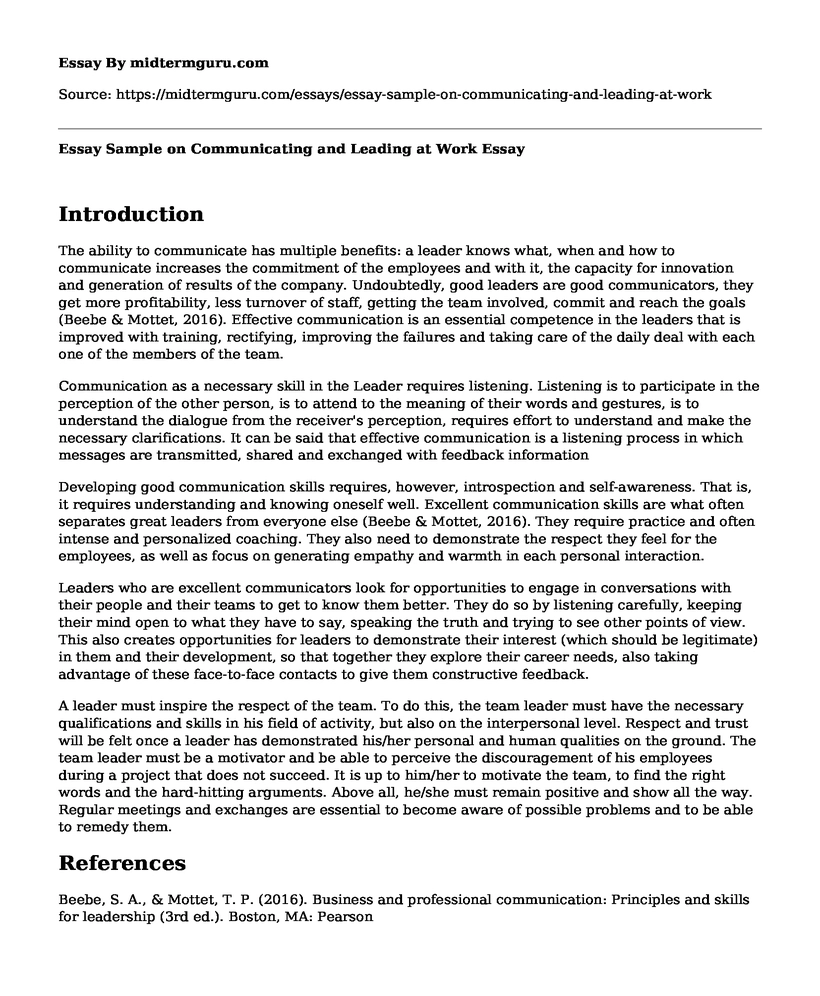Introduction
The ability to communicate has multiple benefits: a leader knows what, when and how to communicate increases the commitment of the employees and with it, the capacity for innovation and generation of results of the company. Undoubtedly, good leaders are good communicators, they get more profitability, less turnover of staff, getting the team involved, commit and reach the goals (Beebe & Mottet, 2016). Effective communication is an essential competence in the leaders that is improved with training, rectifying, improving the failures and taking care of the daily deal with each one of the members of the team.
Communication as a necessary skill in the Leader requires listening. Listening is to participate in the perception of the other person, is to attend to the meaning of their words and gestures, is to understand the dialogue from the receiver's perception, requires effort to understand and make the necessary clarifications. It can be said that effective communication is a listening process in which messages are transmitted, shared and exchanged with feedback information
Developing good communication skills requires, however, introspection and self-awareness. That is, it requires understanding and knowing oneself well. Excellent communication skills are what often separates great leaders from everyone else (Beebe & Mottet, 2016). They require practice and often intense and personalized coaching. They also need to demonstrate the respect they feel for the employees, as well as focus on generating empathy and warmth in each personal interaction.
Leaders who are excellent communicators look for opportunities to engage in conversations with their people and their teams to get to know them better. They do so by listening carefully, keeping their mind open to what they have to say, speaking the truth and trying to see other points of view. This also creates opportunities for leaders to demonstrate their interest (which should be legitimate) in them and their development, so that together they explore their career needs, also taking advantage of these face-to-face contacts to give them constructive feedback.
A leader must inspire the respect of the team. To do this, the team leader must have the necessary qualifications and skills in his field of activity, but also on the interpersonal level. Respect and trust will be felt once a leader has demonstrated his/her personal and human qualities on the ground. The team leader must be a motivator and be able to perceive the discouragement of his employees during a project that does not succeed. It is up to him/her to motivate the team, to find the right words and the hard-hitting arguments. Above all, he/she must remain positive and show all the way. Regular meetings and exchanges are essential to become aware of possible problems and to be able to remedy them.
References
Beebe, S. A., & Mottet, T. P. (2016). Business and professional communication: Principles and skills for leadership (3rd ed.). Boston, MA: Pearson
Cite this page
Essay Sample on Communicating and Leading at Work. (2022, Sep 07). Retrieved from https://midtermguru.com/essays/essay-sample-on-communicating-and-leading-at-work
If you are the original author of this essay and no longer wish to have it published on the midtermguru.com website, please click below to request its removal:
- Ethical Decision Making by Individuals in Organizations
- Managing Family Business - Essay Sample
- Globalization and Migration Impact on Urban Development in Latin America
- Phenomenological Study in Leadership - Paper Example
- Front Desk Supervisor Speech Example
- A Career of Rigor: Nursing Demands Dedication & Compassion - Essay Sample
- Manual for Managerial Change in Metropolitan Schools - Essay Sample







